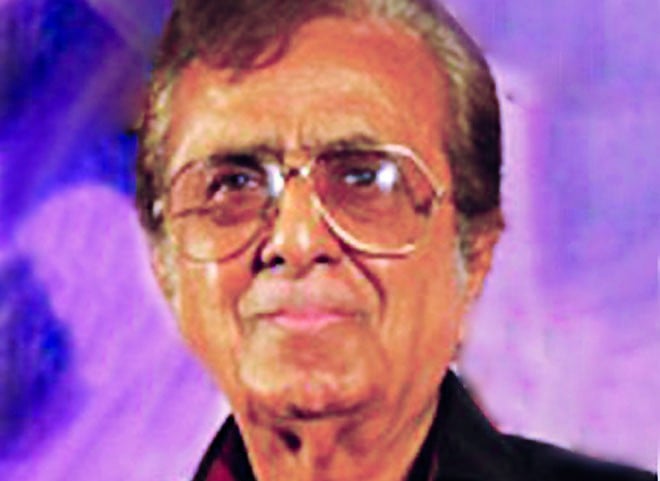
Robin Ghosh composed music that was enjoyed equally by the man in the street and those with sophisticated taste

There was a time when there were many good composers in both India and Pakistan. It appeared the river of talent would never dry up but gradually the flood did recede. It has not dried up completely; it’s only that the flows come in smaller volumes. One such composer who delighted the man in the street with his compositions was Robin Ghosh.
Of Bengali origin, he lived and died outside the territorial limits of Pakistan but spent his most creative phase in what is now the territorial extent of the country. Both working as a composer in Karachi and later in Lahore, the compositions that he created were sung by the leading voices of film music.
The contribution of Bengali composers in cinema has been quite impressive. It can be said that they were largely responsible for crafting the form of the film song. Composers like R C Boral, Timir Baran, Pannalal Ghosh and then Pankaj Mallick were all pioneers and were followed by Anil Biswas and later by the likes of S.D Burman.
It could be that Rabindranath Tagore under the colonial impact had attempted to demystify the creative process with its overwhelming appeal, wresting it away from its mythologically-explained divine origins and its otherworldliness and steering it towards a greater social and political application.
With his ceaseless desire to experiment, he had made the song quite central to musical expression and the later composers, taking the queue from theatre, moulded and reset it for the new emerging medium of film.
Robin Ghosh’s father was in the International Red Cross and posted in Baghdad when Robin Ghosh was born but the family came back to Dhaka when the war ended. The parents being from Bengal and much involved in music -- this atmosphere at home helped Ghosh to play the harmonium and collect a large number of 78 rpm records particularly those of K.L. Saigal. It is said that he was also an apprentice in the choir of the highly talented Salil Chowdhury in the days before Robin Ghosh worked for the Radio in Dhaka.
Ghosh worked as an assistant for composer Moslehuddin at the time when he was working on the musical score of Hamsafar. This was one of the first Urdu films to be produced in what is now Bangladesh. Moslehuddin recorded two tracks in the voices of Hemant Kumar and Sandhya Mukherjee in West Bengal with the help of Robin Ghosh. Though it did not do particularly well at the box office when it was released in 1960, it had a good musical score.
At the radio, he was spotted by Ehtesham who referred him to his brother Mustafiz who made him an offer to compose for films. A year later, Mustafiz produced two Bengali movies titled Rajdhanir Buke and Harano Din and Robin Ghosh was the music composer for both. These were his initial forays into film music but, Chanda and Talaash, produced in Urdu by Ehtesham and Mustafiz received great success. In Chanda, ‘aakhiaan tori rah takain’ and ‘maut ko day do sada’ in the voice of Firdausi Begum were good examples of his sources of inspiration -- the Bengali folk song.
But then came a lean period as he composed music for Paisa, Bhaiyya, Karwaan, and Bandhan -- films that did not do well at the box office. In 1967, however, with the release of Chakori and Chote Sahib, he bounced back. He decided to move to the western wing where more films were made in comparison to the eastern wing but, unfortunately, his first film in Karachi, Pervez Malik’s Jahan Tum Wahan Hum flopped badly and kept Robin Ghosh’s melodious songs from making an impact on audiences. Ghosh, however, didn’t stay down for too long and rebounded successfully in 1972 with the film Ehsas. The strong musical score was well received and marked the beginning of a more than a decade of success.
During his music career, he composed about one hundred and fifty songs for 25 films.
In his compositions for Bengali films, the overall musical ethos was steeped in Bengali folk music. Most of the composers drew heavily upon the rich pool of music in the folk tradition and Robin Ghosh was no exception. Like the films, the music too was imbued totally in the locale of Bengal but as he shifted to Pakistan there was greater and a happier marriage of the Punjabi folk music and the Bengali folk traditions. Even in some of the compositions he leaned a little on the classical ang to create some outstanding compositions, for example those in the voice of Mehdi Hasan.
By diluting the classical ang with more lyrics and simplifying the intricacies involved, it made music accessible to the layman who knew nothing about music minus its auditory experience. Perhaps, this is what was and is expected of the composer working in the media that had a large and diverse audience to cater to.
Robin Ghosh was able to a large degree to fulfill this basic requirement. When he visited Pakistan with Shabnam a few years back, memories of his success and the melodies that he created particularly while living in the area that is now Pakistan came flooding back.